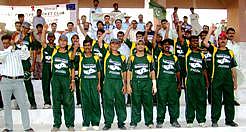World's First HIV Cricket Team
From Darhoon Menghwar, of the Daily Ibrat, a Sindhi newspaper in Hyderabad, Sindh province, Pakistan, who attended a Thomson Reuters Foundation "Reporting HIV/AIDS" course in Bangkok in 2008.

Hyderabad Sindh, Pakistan - A cricket team of HIV-positive players - claimed to be the world's first - has won its first game.
Proud skipper Abdul Latif said he hoped his team's seven-wicket victory over a Hyderabad youth team would help halt discrimination over HIV/Aids in cricket-mad Pakistan.
"This is not only Pakistan's first HIV-positive team, but it is the first in the world," said Latif, who contracted HIV when he was working in Dubai six years ago. "This shows that we can do anything that other men do."
The team was brought together by Pakistan Society, an NGO working for the rights of people living with HIV (PLWHIV) and recovering injecting drug users.
Latif's wife, Ume Kulsoom, who is HIV-negative, called the team "a candle for life" of PLWHIVs. She said that when she learned of her husband's HIV-positive status "I felt as though I had become a dead body. People scorned and rejected me and urged me not to touch my husband, to keep away from him.
"But when the doctors gave me complete information it changed my mind. Now I provide full support to my life partner, we are living together, I am safe because we use condoms."
A psychologist, Zaheer Ahmed, said cricket could fire enthusiasm and ambition in the life of PLWHIVs as well as help reduce discrimination. "The formation of this cricket team is a big step in making society aware," he said. "Scientifically, Aids is uncured - but it is curable through education and awareness."
Pakistan Society - half of whose members are HIV-positive - has been working in the HIV/Aids field for 15 years, providing condoms, clean syringes and education to PLWHIVs and drug users who are a major source of HIV infection. In Karachi, the nearest big city to Hyderabad, about one-third of the estimated 12,000 injecting drug users have contracted HIV.
But HIV/Aids statistics for Pakistan as a whole are disputed. UNAIDS says between 90,000 and 100,000 of the population are HIV-positive, most of them through use of dirty needles. But Dr Nasir Jalbani, Aids Control Authority manager for Sindh province, rejects these figures as much too high. He says they are only estimates, not facts, and that there are actually only 3,000 cases, of which 70 per cent are from drug use.
However, Dr Farooq Soomro, who works with drug addicts, challenges Dr Jalbani's "facts and figures" and says that nationally there are more than 70,000 cases of HIV. He cites female sex workers as a major source, as well as truck drivers who spread infection from cities to rural areas. Some 80 per cent of the population do not use condoms, he says.
Pakistan's HIV/Aids awareness programme is limited, Dr Soomro says; too few people know what it is and how it is spread.
END

